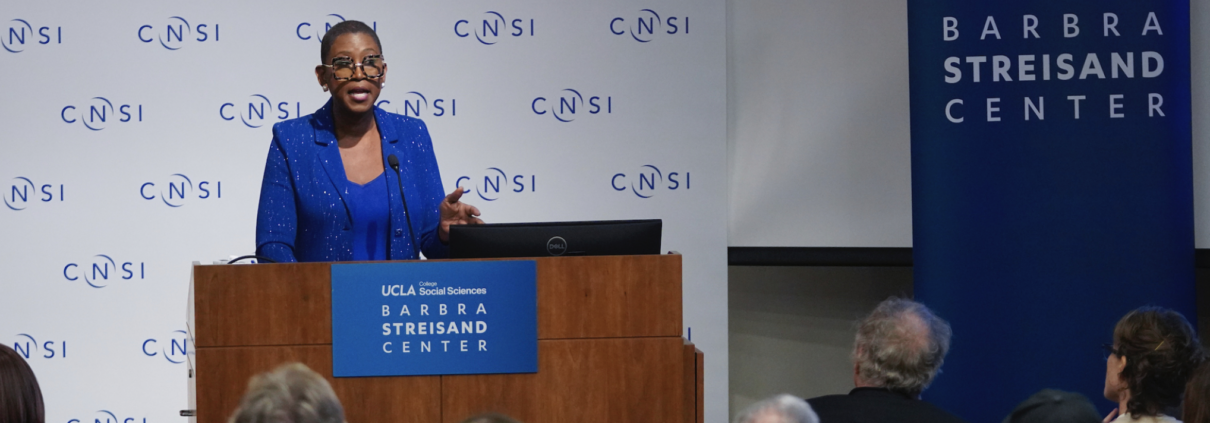
UCLA Newsroom: Second annual UCLA Barbra Streisand Center lecture turns spotlight on reproductive justice
By Lucy Berbeo | Read the original article in UCLA Newsroom.
When the Supreme Court overturned Roe v. Wade in 2022, ending the constitutional right to abortion upheld for half a century, the effects were almost immediate. More than two years later, on the eve of a landmark U.S. election, all eyes are on the future of reproductive rights. Yet at the second annual UCLA Barbra Streisand Center lecture, held Oct. 16 on campus, experts drew lessons from history to provide deeper insights into the current crisis — and what’s next.
In a prerecorded message introducing the event, which featured a keynote address by reproductive justice expert Michele Bratcher Goodwin, Streisand stressed the conversation’s urgency.
“The MAGA Republicans and their highly regressive agenda would erode decades of hard-won gains in women’s rights, economically and socially as well as reproductively. As we tragically saw in Georgia recently, it is also literally a matter of life and death for American women,” Streisand said. “In an era where social media and partisan news outlets can easily spread disinformation, voters may find it difficult to separate fact from fiction. Safeguarding access to accurate information is not only about protecting reproductive rights, but also about preserving the integrity of the democratic process itself.”
Goodwin, the Linda D. and Timothy J. O’Neill Professor of Constitutional Law and Global Health Policy at Georgetown Law, in her address underscored the importance of understanding our legislative history, tracing the roots of the current crisis to the brutal system of U.S. slavery.
“We tend to think about American slavery as that which is just about filling the coffers economically. And yes, it was that, but slavery was not just a matter of labor; it was a matter of reproductive labor,” Goodwin said, pointing to documented patterns of rape of enslaved Black women and, in turn, the enslavement of their children. “This is the story of our past, and it’s a past that’s worth us recognizing, as we are now in a period which I’ll jump to and call ‘the new Jane Crow.’”
Goodwin said the Supreme Court’s decisions have resulted in consequences leading far beyond attacks on abortion rights.
“We have high rates of maternal mortality in this country. In fact, we lead all industrialized nations in maternal mortality,” she said. “We have girls now going into elementary school as parents in this country. We have places where there are reproductive health care deserts. In Idaho, there are women being helicoptered off to be able to save their lives elsewhere. In South Carolina and Louisiana, there’s been the proposal of the death penalty for women who have abortions.”
Presenting her vision for a path forward, Goodwin made the case for a new period of “reconstruction” following those that emerged after the Civil War and during the civil rights era. She said LGBTQ equality and gender-affirming care are also at stake.
“We have to begin to see the attacks on reproductive health care as attacks on our broader democracy,” Goodwin said. “And I think when we envision a third Reconstruction, hopefully we’ll envision one that is not narrow, but one that is fulsome.”
The annual lecture series was launched after Barbra Streisand donated funds in 2021 to establish a forward-looking institute at UCLA focused on solving societal challenges, including disinformation in the public sphere.
“UCLA’s academic community is committed to seeking evidence-based solutions to the urgent issues that affect us all,” said Abel Valenzuela, UCLA’s dean of social sciences, who provided opening remarks at the event. “We are profoundly grateful to Barbra Streisand for the opportunity to host renowned experts and thought leaders on our campus in service to this mission.”
Following her keynote, Goodwin was joined by panelists Jessica Gipson, director of the UCLA Bixby Center to Advance Sexual and Reproductive Health Equity, and Melissa Goodman, executive director of the UCLA Center on Reproductive Health, Law and Policy, for a discussion moderated by UCLA Barbra Streisand Center director Grace Hong.
The panelists highlighted the work of scholars at UCLA and across higher education to advance research that can help inform policy. Closing with a call to action, they emphasized that finding solutions will require the efforts of everyone — both in and out of the academic community.
“It’s all-hands-on-deck right now: legal scholars, public health, medicine, humanities, everyone,” Gipson said. “We all have something to do and to contribute right now, in addition to voting, if you are eligible to vote. That brings me a lot of hope.”

